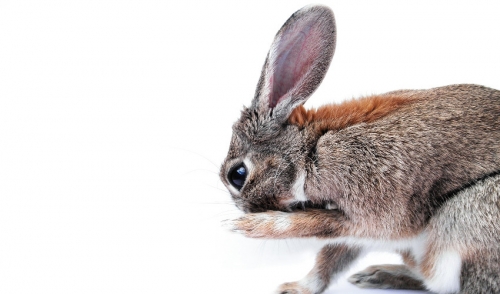Rabbits are naturally clean and frequently self-groom, but a responsible rabbit owner will regularly groom their pet to keep it looking polished and pristine. Are you grooming your rabbit the right way?
Why Grooming Matters
Since rabbits will self-groom, why is it necessary to have a grooming regimen for your pet rabbit? Good grooming can lead to better health and a more comfortable life for your rabbit. As rabbits self-groom, they ingest bits of fur that can eventually clog their digestive tract and lead to painful, even deadly, blockages. The matted fur of an ungroomed rabbit can lead to skin irritations and less protection from cold or moisture. Grooming time can also be a great time to assess other aspects of your rabbit's health, such as checking for mites, fleas, ticks or other pests, as well as injuries, rashes and similar skin irritations. Furthermore, grooming is a good time to bond with your rabbit, helping them be comfortable being handled and petted so they are less anxious or stressed. With so many benefits to grooming, why not get started today?
Tips for Grooming Your Rabbit
Grooming a pet rabbit does not have to be difficult, but it is different than grooming a cat or dog. To keep your rabbit healthy, comfortable and well-groomed…
- Always be gentle when grooming a rabbit, as these animals have very sensitive skin which can be easily irritated or injured. Always use the proper tools for rabbit grooming and stop if the rabbit shows signs of distress.
- Rabbits should be brushed 1-2 times per week, and even more frequently during heavy shedding periods or for long-haired breeds. If necessary, several shorter, more frequent grooming sessions may be less stressful than longer sessions.
- Use the proper tools for the rabbit's coat type. Soft-bristle brushes are preferred because they are less irritating to the rabbit's skin. Combs, mat rakes, rubber mitts and other grooming tools may also be needed.
- Clean a rabbit's ears with a soft, damp cloth and use a cotton swab to remove wax buildup. Do not penetrate deeply into the ear canal, however, which could injure the rabbit's ears or push wax or other debris deeper into the ear.
- Use a soft cloth to gently wipe around a rabbit's eyes to remove any debris or discharge. If the rabbit's long fur is obscuring its eyes, some trimming may be necessary to keep fur from irritating the eyes or obstructing vision.
- Trim your rabbit's nails regularly to prevent them from getting too long. Sharp nails or baby rabbit nails may be gently filed, but if clipping the nails, be sure not to clip into the nail's blood supply. Have clotting powder on hand if needed.
- Clean your rabbit's anal scent glands with a clean, damp cloth. If the glands are impacted or blocked, moisten them gently with mineral oil or water and allow it to soften before wiping away the excess matter.
- Do not give your rabbit a bath at any time. Bathing is too much stress for rabbits, and their coats do not dry quickly which can lead to hypothermia. Instead, spot clean your rabbit if necessary with a damp cloth rather than an immersive bath.
- Follow up with a treat, petting and praise after grooming your rabbit to help the bunny realize that grooming can be a positive experience rather than a stressful one. This will make future grooming tasks even easier with a relaxed rabbit.
One of the best ways to groom your rabbit is to minimize the need for extra cleaning by keeping the animal's environment clean. Be sure the bedding and litter box are cleaned and changed regularly, and wipe up any food or water spills right away so debris does not get in your rabbit's fur. Any pen, hutch or other enclosure should also be cleaned regularly. With care and dedication, your rabbit can always be well-groomed and looking its best.






Comments